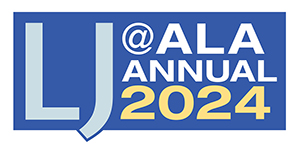FIU Transforms Library Services with AI | ALA Annual 2024
Anyone who is attending this year’s American Library Association (ALA) Annual Convention in San Diego hoping to hear more about artificial intelligence (AI) and its impact on libraries has not been disappointed. “Breaking Boundaries: Harnessing the Power of Artificial Intelligence and ChatGPT to Transform Library Services,” one of the earliest panels on Saturday morning, was presented to a full house—five conjoined rooms with every seat taken.
 Anyone who is attending this year’s American Library Association (ALA) Annual Convention in San Diego hoping to hear more about artificial intelligence (AI) and its impact on libraries has not been disappointed. Multiple panels and presentations have focused on different aspects of AI, and unsurprisingly, the hot topic popped up in many other technology-related sessions as well.
Anyone who is attending this year’s American Library Association (ALA) Annual Convention in San Diego hoping to hear more about artificial intelligence (AI) and its impact on libraries has not been disappointed. Multiple panels and presentations have focused on different aspects of AI, and unsurprisingly, the hot topic popped up in many other technology-related sessions as well.
“Breaking Boundaries: Harnessing the Power of Artificial Intelligence and ChatGPT to Transform Library Services,” one of the earliest panels on Saturday morning, was presented to a full house—five conjoined rooms with every seat taken. Rebecca Bakker, digital collections librarian, Florida International University (FIU); Melissa Del Castillo, virtual learning and outreach librarian, FIU, and current Chair of the Reference and User Services Association (RUSA) Reference Services Section (RSS); and Christopher Jimenez, web services librarian, FIU, discussed how FIU Libraries are teaching AI literacy, integrating AI into library workflows, initiating collaborative projects, and more.
Following an introduction by Del Castillo, Jimenez began the session by explaining how FIU Libraries is currently approaching AI literacy, partly using the Association of College and Research Libraries’ Frameworks as a guide. Illustrating the approach with a three-layer pyramid, he explained that they help students learn how to use AI tools as a base. The middle layer helps students understand how AI can fit into the research process, and highlights concerns about issues such as the sources of data that different AI tools are using. The top of the pyramid involves teaching how AI works—not at programmatic level, but at a level that demystifies the technology and helps set realistic expectations for what AI in its current state can do.
However, Jiminez went on to add that AI literacy efforts also assume some degree of digital literacy, media literacy, and data literacy. “AI literacy is not always as simple as a three-layer pyramid,” he said. “Sometimes it's more like a four-layer cake. When you serve yourself a slice of AI literacy, you're really getting a mouthful of data, media, and digital literacy, in addition to all that yummy AI goodness.”
After about a year of relying on the ACRL frameworks, Jiminez said that FIU libraries has begun to look at AI literacy as a progressive skillset, involving demystifying, demythologizing, demonstrating, and then democratizing the technology.
Bakker continued the session with a presentation on integrating AI into library workflows. She began by discussing user prompts to generative AI tools such as ChatGPT as “a collaborative conversation,” noting that users will get the best results with prompts that are concise, clear, and explicit, and are then further revised and refined following the AI’s response.
Librarians are “used to searching for things,” Bakker said. “You search a database, and you get too many responses, and you know how to refine your search. Similarly, when working with large language models, I think that's kind of the mindset that we need.”
Several library tasks have the potential to be assisted by AI tools, such as using social media to promote digital repository content, information retrieval from a digital repository, automated speech recognition, and facial recognition in digital archives, Bakker said. However, she added a note of caution regarding facial recognition. A grant had enabled FIU to experiment with facial recognition in its own digital archives, but after focusing the training sets on public domain images that wouldn’t violate any privacy concerns, they realized the sets predominantly included white men. Homogenous image training sets like these make AI less able to identify photographs of women or other ethnicities.
Del Castillo concluded the session with a presentation on initiating collaborative AI projects, suggesting that individuals interested in becoming more involved with AI in libraries get started by experimenting with AI tools to do tasks such as summarizing an article with an AI assistant, crafting prompts to ease the writing demands of a low-stakes project, or using an AI tool to create an image for a presentation. Hands on experience will make users feel more comfortable joining larger conversations, which could include joining open groups on ALA Connect, for example, and then ultimately participating in presentations, workshops, and conferences.
“There is a barrage of information, whether it's in the news like the New York Times, or academics, or tech all three giving you three different perspectives about AI,” Del Castillo said. “So how do you keep up? It is quite difficult to be on [top of] the latest and greatest with all of the information coming out…so the next step is to seek partners.”
Those partners can be within an institution, such as finding a university department that is interested in working with the library. More broadly, local, state, national, or even global professional associations could be of interest. One question to ask is “Who is as excited by the prospects of AI as you are?”
RELATED
ALREADY A SUBSCRIBER? LOG IN
We are currently offering this content for free. Sign up now to activate your personal profile, where you can save articles for future viewing









Add Comment :-
Comment Policy:
Comment should not be empty !!!